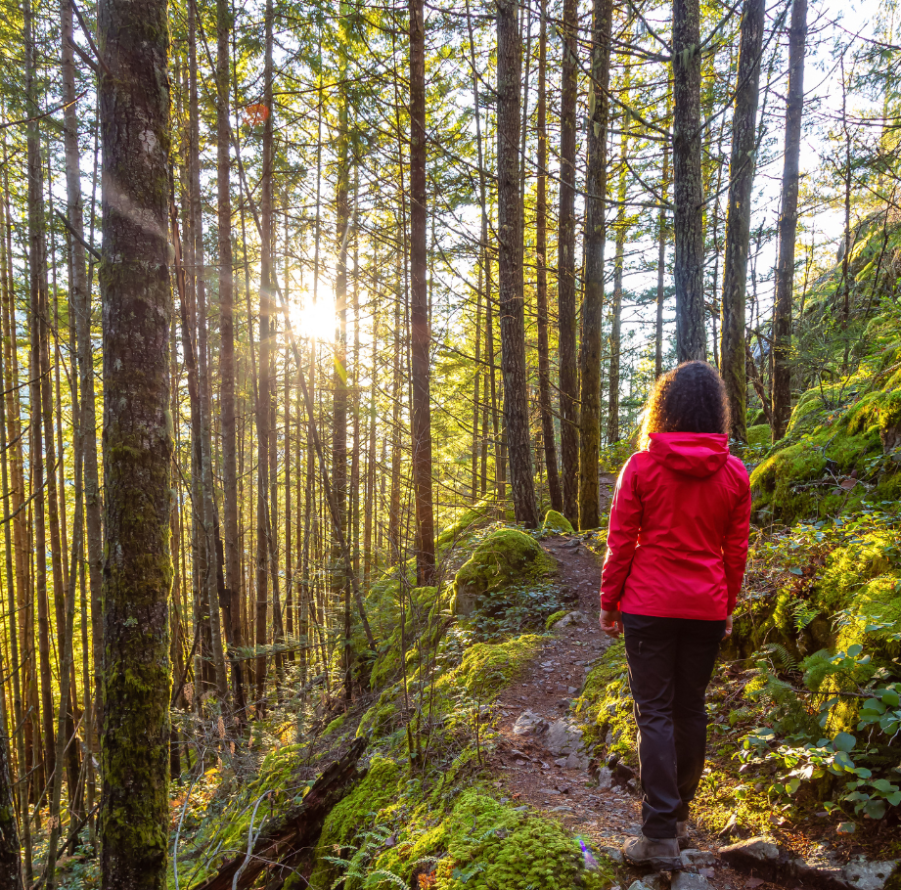One of my favorite things about spending time in nature is that there are so many ways to do so. From backpacking to birdwatching to reading a book under a tree, the natural world is unequal for healthy, relaxing recreation. Mindfulness practices in nature are becoming increasingly popular for their many health benefits, especially since the COVID pandemic. As more and more people began turning to the outdoors for alone time, rest, and relaxation, the secret absolutely got out! One of the biggest recent trends in nature recreation in regions like North America and Europe is forest bathing, or shinrin-yoku.
In this Outdoor Tips post, let’s learn about forest bathing: its origins, benefits, and how to do it. Curious about what else forests do for us? Check out this post on why we need forests.
Shinrin-yoku

Although people from all cultures have sought solitude and introspection in nature throughout history, the term “forest bathing” is Japanese in origin. It comes from a literal translation of the term shinrin (forest) yoku (bath). The practice involves spending mindful, typically quiet time in a forest for therapeutic benefits to health and wellness. I see many similarities between shinrin-yoku and grounding techniques espoused by mental health professionals. By engaging the senses and concentrating on the beauty or complexity of a natural scene, forest bathers experience a variety of benefits. You’ll find these outlined more thoroughly in the next section.
It doesn’t surprise me that shinrin-yoku originated in Japan. Like other temperate biomes like Western Europe, New England, or Northeast Asia, Japan has a lot of forest cover. Aspects of Japanese culture rooted in Zen Buddhism and Shinto place spiritual value on outdoor places, emphasizing their importance. Because of this, it makes sense for a practice like this to gain a foothold there. However, the actual term doesn’t have ancient origins as with practices like yoga.
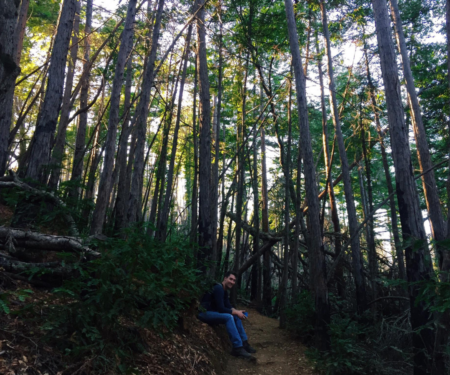
In fact, it has a modern origin, put forward in 1982 by the country’s Ministry of Agriculture. In large part, the name and its recommendation for public health came as a response to Japan’s growing urban population and a rise in scientific evidence around the health benefits of spending time outside.
What are the benefits of forest bathing?
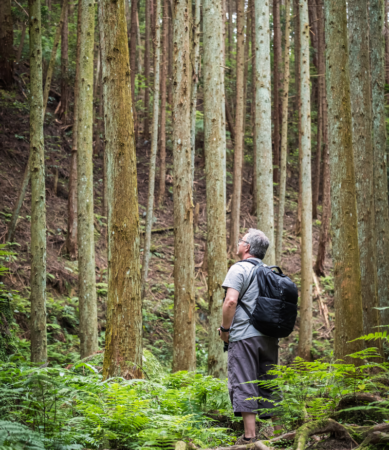
Spending time in the outdoors has a surprising number of benefits, from bodily and mental health to stress relief, better mood, and improved sleep. Every time I do research on this topic, I find more than I did before. It’s a truly exciting topic and one with an increasing amount of support and uptake. Here’s a quick recap of major benefits, with links to longer posts getting into the peer-reviewed science if you’d like more details.
Mood and mindset
Spending time in natural places can do wonders for mental health. This is especially true for helping people get a more positive outlook and easing negative moods. Again and again, I have found myself feeling more optimistic, hopeful, and engaged with my life after a quick walk in the woods.
Brainpower and creativity
Several clinical studies found that students and adult test subjects performed better in problem-solving and creativity tasks after exposure to nature. Some of my best ideas have come from long hikes in Winter woods and other natural spaces. My recent TEDx talk explains how time outside is a must for creatives, entrepreneurs, business leaders and others for these great benefits.
Reducing stress and blood pressure
Stress is a major underlying factor in many diseases and health problems. Unfortunately, it also affects most of us on a daily basis, and can be problematic over long periods of time. Forest bathing and other activities in nature can greatly reduce stress hormone levels, blood pressure, and other signs of stress.
Better sleep
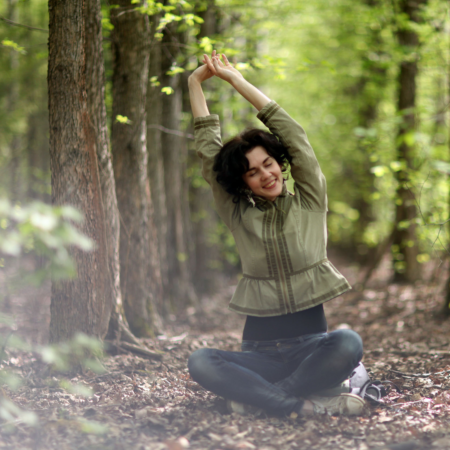
If you’re anything like me or nearly half of U.S. adults, you may struggle to get enough sleep. Alternatively, even if we get enough hours, the sleep itself might be shallow with many interruptions. Sleep studies indicate that outdoor practices like forest bathing can help alleviate many of these issues. Furthermore, these benefits occur whether or not you’re sleeping outside. So, if you’re not a fan of camping, no problem! A couple good walks in your local nature, and you could find yourself catching more Z’s than usual.
Immune health
With new emerging diseases like COVID-19 and annual flu strains, our immune systems are under more stress than ever. One great way to give them a better, fighting chance, is to get time outdoors. While some relaxing time outside may boost immune function by itself, there is another interesting factor at work here. Phytoncides are chemicals that trees produce and which are often concentrated in the air in dense and healthy forests. They have anti-microbial properties which can reinforce immune function and may give forest-bathers a leg up on nasty illnesses. This is especially true in conifer forests, which have higher concentrations of these chemicals.
5 tips for forest bathing
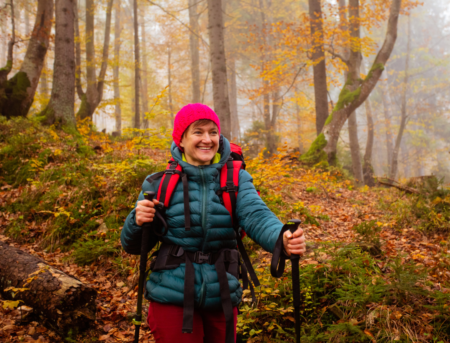
After hearing all about these many benefits, you’re probably wondering how to get started. Great news: if you’ve got access to a forest, you can forest-bathe. In fact, I would argue that you can forest-bathe in all kinds of natural settings. Meadow-bathing anyone? Marsh-bathing? That last one sounds a little messy, but you get my point.
Here are some helpful tips to get started. If you’re looking for more general advice, check out my 5 ways to get more out of your outdoor time.
- Find a peaceful natural area where you feel safe, comfortable, and relaxed. If you want more advice on picking spaces for stillness and reflective time in nature, check out my guide on How to do a sit spot.
- Notice what’s around you. The natural world can be subtle in its beauty, and it can be easy to miss the small things. However, this is often where you’ll find the most interesting things!
- Leave other thoughts and worries at home. It can be easy to get caught up in things when your immediate surroundings aren’t demanding your attention. Because of this, mindfulness is a central part of forest bathing. By concentrating on leaving outside thoughts behind on your forest bathing experience, you will greatly increase its positive impact.
- Breathe deeply and slowly. Breath control is an excellent way to relax and concentrate on your surroundings. It helps quiet the mind, and lets you take maximum advantage of that good, fresh forest air!
- Close your eyes and listen for a while. As visual creatures, humans can get overwhelmed by looking at things. Sometimes concentrating on a different sense, like hearing, can go a long way in improving mindfulness. Furthermore, natural sounds like birdsong can improve relaxation.
- Try to spend at least 5 to 20 minutes forest bathing, but of course the more the better! While even brief sessions can do a lot for your health, many studies on the wellness benefits of nature indicate that durations of 20-30 minutes are necessary.
Thanks for reading about forest bathing!
Do you have other advice to help readers with their Shinrin-yoku? Share with us in the comments! If you enjoyed this post and would like to support Gulo in Nature, please share it with friends or on Social Media. Thank you!

